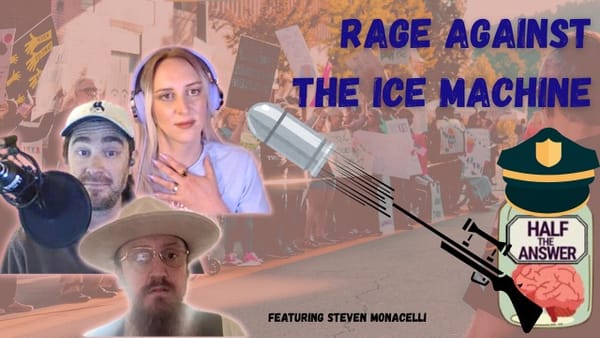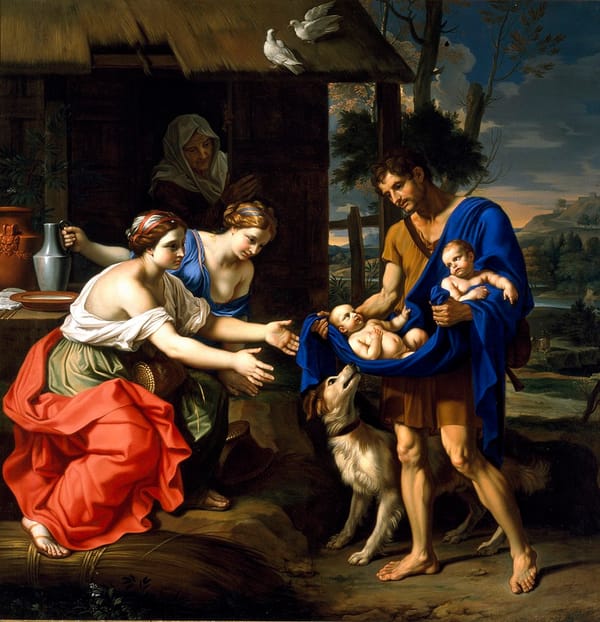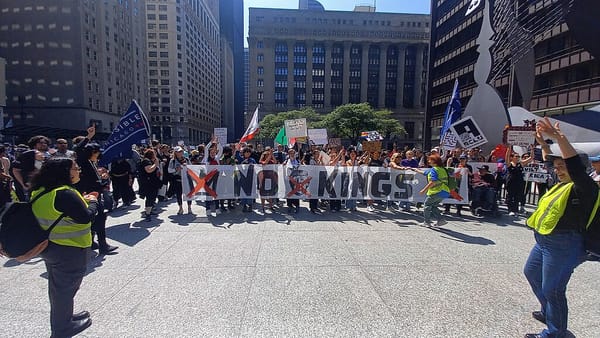Emotional Supports to Liberalism: Timothy Stacey's Saving Liberalism From Itself

The rosy blush of its laughing heir, the Enlightenment, seems also to be irretrievably fading, and the idea of duty in one’s calling prowls about in our lives like the ghost of dead religious beliefs. Where the fulfilment of the calling cannot directly be related to the highest spiritual and cultural values, or when, on the other hand, it need not be felt simply as economic compulsion, the individual generally abandons the attempt to justify it at all. In the field of its highest development, in the United States, the pursuit of wealth, stripped of its religious and ethical meaning, tends to become associated with purely mundane passions, which often actually give it the character of sport. No one knows who will live in this cage in the future, or whether at the end of this tremendous development, entirely new prophets will arise, or there will be a great rebirth of old ideas and ideals, or, if neither, mechanized petrification, embellished with a sort of convulsive self-importance. For of the first stage of this cultural development, it might well be truly said: “Specialists without spirit, sensualists without heart; this nullity imagines that it has attained a level of civilization never before achieved.
The Protestant Ethic and the Spirit of Capitalism, Max Weber
Few would have predicted in 1989 that within thirty years liberalism would once again be faced with a crisis of legitimacy. Nothing of the sort was supposed to happen. Francis Fukuyama had predicted that a conservative yearning for thymotic recognition and glory might lead to a rebirth of history, but (at the time gloomily) predicted it was unlikely. Radicals like Slavoj Zizek spent much of the 1990s complaining that almost every leftist was a “closet” supporter of the status quo, having so internalized the Thatcherite dictum that there was “no alternative” to neoliberal capitalism. So they contented themselves with preserving what was left of the welfare state while chastising social liberals for moving too slowly on ending racism, sexism and homophobia. Conservatives aplenty read Alasdair MacIntyre’s After Virtue and agreed with his apocalyptic claim that the barbarians weren’t even at the gates—they were amongst us. But as far as many were concerned, too much damage had been done and there wasn’t even much left worth conserving. So the right drifted into its job of preserving respect for property while half-heartedly slowing down the inexorable advance of social liberalism.
Yet the political events between 2015 and 2018 can only be described as a global crisis of legitimacy for liberalism. Proudly illiberal populists won power in many of the world’s leading countries and were gaining ground almost everywhere else. Cautiously optimistic, sometimes even euphoric, conservatives rushed to produce eulogies with dramatic titles like Why Liberalism Failed and The Return of the Strong Gods. When Jair Bolsonaro capped the wave on January 1st 2019 it meant that Brazil, Italy, the United States, Russia and India were all governed by demagogic right-wing leaders. The United Kingdom and France were rocked by burgeoning nativist movements, and disturbingly even Germany saw ballooning support for the far right AFD party. Alongside these shifts in political power were the shocks of Brexit, ongoing anger at inequalities in wealth and influence, spreading nativism, and of course the widespread rejection of the cherished Enlightenment faith in science when it came to the pandemic. While Biden’s 2020 victory and lukewarm wins in France, Germany, and elsewhere rolled back the wave a bit there’s no doubt liberalism remains in a dangerous spot.
Where did liberalism go wrong?
Timothy Stacey’s warm and humane new book Saving Liberalism From Itself: The Spirit of Political Participation addresses these kinds of big picture questions head on. Unafraid to delve into modes of being and analysis that liberals often fear to tread, it is a helpful corrective to liberalism’s frequent blind spots. While Stacey identifies with the left end of the liberal spectrum, he has a unique capacity to empathize with the needs and histories of a wide array of personalities. This in itself reflects a humanist disposition which liberalism was once known for, but which has since been marginalized by more technocratic and abstract modes of analysis. Consequently Stacey’s approach to saving liberalism is mercifully free of the shrill alarmism elite liberals fell into when they wrote articles with titles like “It’s Time for The Elites To Rise Up Against the Ignorant Masses.” These kinds of op-eds assumed that there was nothing wrong with either the status quo or its ideological convictions, only the ignorant boobs at the bottom and the populist shysters that manipulated them. While the dishonesty of Trump and populists like him are undoubtedly beyond the pale, they would never have found an attentive audience for their snake oil unless there were genuine grievances within liberal societies.
Stacey draws heavily on communitarian critiques of liberalism throughout the early part of his analysis, though blunting their more conservative edges. In this respect he falls within an important tradition of moderate left-Hegelianism which has an especially auspicious history in Canada, where Stacey conducted much of his research. Canadian philosophers like C. B. Macpherson and Charles Taylor were keen to preserve the emancipatory core of liberalism, couple it with extensive redistributive policies, and marry it to a more communitarian ethos stressing solidarity through a recognition of difference. This communitarian ethos was to provide what Hegel characterized as an integrative ethical life, which in its most substantial form could provide a sense of religious or spiritual satisfaction for its members. Figures like Taylor took very seriously the young Marx’s materialist critique of religion as the “heart of a heartless world” which emerged to placate an individual’s longing for meaning where their society was filled with alienation. Rather than finding a solution in a transformative project of political economy, they instead sought a rejuvenation of society through fostering egalitarian communities more aggressively than liberal individualists might have while still maintaining respect for most of the basic structures and rights of liberalism.
The spirit of this tradition is very much carried forward by Stacey, who chastises liberals for ignoring people’s aspiration for meaning, mythology and even magic within democratically managed communities. Part of this is due to the fact that liberals have tended to side with Kant and Hayek over Hegel or Mill in regarding themselves as cold-hearted rationalists, committed to individual liberty and property as dictates of universal reason or even required by a scientifically minded utilitarian scheme. Some liberals even take pride in deliberately refraining from the cultivation or expression of strong feelings towards anything, instead doggedly insisting on a Goldilocks politics backed with plenty of scolding for everyone across the political spectrum that goes too far. The problem is that while aiming squarely for the temperate middle may secure you a modest reputation for virtue, it also opens you to accusations of banality. One way reactionaries since De Maistre have weaponized this is through characterizing liberalism as bloodless and aloof. Nietzsche went even further and accused “blockheads” like Mill of being boring, middle class penny pinchers with dreams so shallow one could wade through them without getting the knees wet.
Stacey has little truck with these kinds of arguments of course, but does stress how reactionary claims will resonate with people eager for more than what liberals are willing to offer them. His left-liberal communitarianism stresses how individuals find a great deal of meaning and significance through participating in local groups. Much of his data on this point comes from extensive interviews Stacey conducted with a variety of interviewees in the city of Vancouver’s Metro Vancouver Alliance, which brings together “religious groups, trade unions, community groups, and schools to work towards the common good.” Of course interviewing individuals from such an Alliance isn’t necessarily a randomized spread of the population, and one worry is that the book may infer more general conclusions than is warranted by listening mostly to interviewees who are likely already quite community minded. Nevertheless his interviews are fascinating and suggestive within limits. One of the more interesting themes is that many of the individuals Stacey talks to seem to have internalized liberal mores into their life narratives and community mythologies. References to individual dignity, rights, and overcoming oppression abound. It’s at the social and political level that many of them feel liberalism is failing to live up to its idealizations, which in turn leads to a sense of alienation and disappointment with nominally representative institutions. An irony given how many pundits insist on saying the institutions are fine, it’s only actually-existing liberal citizens that are a problem.
Emotional supplements to liberalism
Stacey argues that these community exercises show that what people long for is emotional supplements to liberal morality. These can only come from within the community, its rituals, and its mythologies. These can be secular of course, but they are more conventionally religious. In this he demonstrates a friendliness towards practices many more rationalistically inclined liberals tend to condemn as superstition at best and a precursor to irrationalist fundamentalism at worst. Rather than attempt to wean individuals off of ritual and mythology, a la the Bertrand Russells to Richard Dawkins of the world, he thinks we need to empower forms of ritual and mythology which provide emotional supplements to liberalism. This should be feasible since, like all political doctrines, liberalism began through mythmaking constructions which it subsequently cut like an umbilical chord after winning power as part of an effort to present as more natural or even inexorable.
Liberalism has myths, and liberal people-human beings like the rest of us-are inspired by myths. The problem is that liberal politicians and policymakers too often forget this. As the rise of populism across the Western world has demonstrated, our seemingly watertight rational-legal edifice is in fact deeply vulnerable and easily challenged by just any charismatic individual able to spin narratives of a lost past in which things were great. And yet rather than questioning how legitimacy is established, liberals emphasize, for example, the economic advantages of Scotland remaining part of the UK: the UK remaining part of Europe; or for electing this or that ‘moderate’ politician. They treat grassroots community organizations with suspicion. They think of the voting public as individualist, rational actors and question the sanity of those who fail to conform to type.
Stacey is absolutely right both about his historical and his present point. In the beginning (see what I did there) both liberal theorists and politicians were stupendous mythmakers. What else can you call the leviathan, the social contract, natural rights and so much else but myths so successful they did what the great mythologies do: become part of our common parlance? Revolutionaries like Jefferson, radicals like Martin Luther King and Fredrick Douglass, and statesmen like FDR knew they had to inspire as well as persuade. And that the best way to do the former was to integrate their transformative liberalism into elaborated national or universal mythologies which were marked by their emancipatory inclusion rather than the chauvinistic fundamentalism that so alarms the most pugnaciously bourgeois. Yet it is indeed hard to think of any liberal of significance who has accomplished such feats in a very long time. Even smooth charmers like Justin Trudeau or Barack Obama are frequently associated with disappointment and cynical compromise. Yet Stacey offers another way forward. Rather than look for a liberal icon to lead from above, perhaps it’s time to follow the insights of his ethnographic discoveries and foreground community building from below.
The way forward
A rejuvenation of the left-liberal communitarian approach is long overdue, but Saving Liberalism From Itself brings with it some of the old problems. Here I’ll just discuss two.
The first concerns the idea of liberal community foregrounded in Stacey’s book. One of the frequent objections to even left-liberal communitarianism is that it risks turning quickly back into a kind of conservatism, privileging traditionalist hierarchies and even illiberal oppression in the name of sustaining a meaningful way of life (at least for those privileged by it). This is obviously not the ambition, but left-communitarians have never given entirely satisfactory answers to the concern. This is unusual since I think the response should be quite straightforward: community is vital and liberals should encourage it, but communities should ideally be constructed democratically within a framework that respects all their members as equals. To the extent these communities obtain social power, they should also be more inclusive and open to extending membership while being responsive to the needs of others who remain outside the community. One could even attach this as a further supplement to Stacey’s case by arguing that a democratically conceived and maintained community would be less alien and more responsive to its members and others than a rigidly hierarchical and closed one. Given this it’s strange he spends comparatively little time discussing democracy, even though it is implicit within many of the participatory practices he cherishes.
Secondly, and more importantly, Stacey’s book continues the long tendency of left-communitarians to mostly ignore questions of political economy and economic power. This is especially surprising given how many trade unionists were interviewed in the book and how much Stacey seems to admire them. Here left-communitarianism is vulnerable to the same objections Marx raised against the Young Hegelians. By focusing so much on the soul of man, they ignored his hands, stomach, and back. In the 21st century neoliberal reforms effaced many of worker communities, like unions, through which individuals gained both meaning and access to higher wages and better working conditions. They established disciplinary conditions wherein individuals faced ever increasing pressures to retain employment and develop their social capital. Often requiring the adoption of just the “anywhere” attitude Stacey bemoans as being willing to relocate anywhere for work became almost a given. And it fostered the competitive ethos which proved acidic to many communitarian ideals, and which proved so powerful right-wing “populists” like Trump continue to embody it. What else is his continuous chanting about the “winners” and “losers” in life but a pithy summation of the Reaganite era from which he sprang to play a hyperreal TV businessman?
Stacey is aware of these issues, and his book includes criticisms of inequality and enthusiasm for union activism. But it would have been nice to see them discussed in more detail in the book. This is especially true since one of the defining political-theoretical questions of the day is whether liberalism must align itself so symbiotically with the most aggressively individualist forms of capitalist markets, or whether its moral core is not only compatible with but better suited to a more humane kind of economy and society.
Despite these objections Stacey has written a very impressive and elegant book that reminds liberals that the soul of humankind is as important as its head, and they have been neglecting the soul for a long time. People should regard it as a vital rejoinder to the veneer of technocratic remove which many of us prided ourselves on as a sign of impartiality, but which only served to distance ourselves from our fellow citizens who wanted a world better than the one they’d been given.




